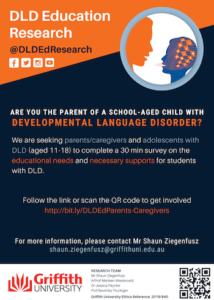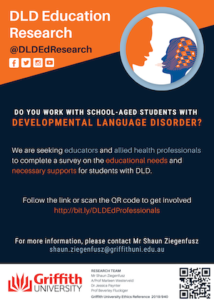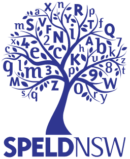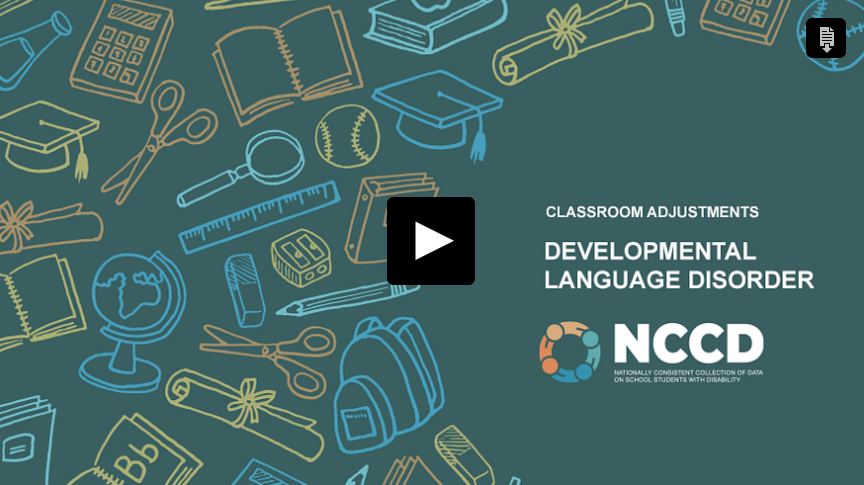Did you know that two children in the average classroom have a common condition known as Developmental Language Disorder (DLD)? DLD occurs when a person has difficulties understanding and/or using spoken language for no known reason. The term DLD was developed through international consensus in 2017 and recommended to replace other terminology such as specific language impairment, language delay/disorder, and language difficulties. It often presents in early childhood and is a lifelong condition. DLD is described as a “hidden condition,” because the signs are not obvious – these children look like every other student. However, associated difficulties such as poor reading progress or challenging behaviour may be signs of DLD. DLD affects 1 in 14 people, making it 7 times more prevalent than Autism.
Signs of DLD
Children with DLD are as intelligent as their peers, but may experience difficulties with:
- understanding instructions
- answering questions
- learning new words
- putting words together to speak in sentences
- reading
- writing sentences
- telling stories
- playing with others
A child with DLD may struggle to follow instructions (i.e. “Before you get your English book out, put your pencil case on the desk”) and use shorter and simpler sentences when speaking (i.e. “She kick ball” instead of “She kicked the ball”). They may also present with other co-occurring difficulties such as dyslexia, ADHD, dysgraphia, dyscalculia and developmental coordination disorder/dyspraxia. This can put a student with DLD at serious risk of struggling with mental health or being bullied, as well as having an increased likelihood to fail at school.
What can you do?
Firstly, it’s important to remember students with DLD are very capable of achieving at school with the right supports in place.
We hear from children with DLD that they often feel invisible and misunderstood in the classroom. They also report feeling that their abilities are grossly underestimated. With this in mind we recommend a child is assessed by a speech pathologist as soon as possible if they present with:
- obvious difficulties with speech, language or communication
- challenging behaviour
- departures from typical development in other areas of growth or learning (e.g. motor) in under 5 year olds
- persistent difficulties with understanding and/or using language.
If you don’t have a speech pathologist at your school, you can direct the family to Speech Pathology Australia’s Find a Speech Pathologist page or Google speech pathology services in your local area. Families can self-refer to many speech pathology services, but they may also like to speak to their GP who may be able to help them access a Chronic Disease Management plan through Medicare. Write down your concerns about the child’s language, literacy and learning for the family to share with the speech pathologist. If you’d like further evidence, consider administering the Clinical Evaluation of Language Fundamentals – 5th Edition Screening Test, which can be completed by a teacher in 15 minutes.
How to support a child with DLD
For children who receive a diagnosis of DLD, it is important for teachers and speech pathologists to collaborate to support their learning. Teachers are experts in delivering the curriculum in a classroom setting, while speech pathologists have key skills in language and literacy development. Developing a plan and working together with the family will be key to the success of students with DLD. While DLD isn’t as visibly present as a hearing aid or a wheelchair, there is still a lot that can be done to make adjustments in the classroom setting. There are excellent resources available for making classroom adjustments for students with DLD at the following link: https://www.nccd.edu.au/professional-learning/classroom-adjustments-developmental-language-disorder.
Become a DLD Advocate at your place of work
The other important thing you can do is educate yourself and your peers on DLD. The world is gradually becoming more DLD aware and therefore, resources formed from evidence based practise are being developed and shared to inform how we best support people with DLD. You can access further information, resources and training about DLD, at www.theDLDproject.com.
Shaun Ziegenfusz is a speech pathologist, PhD candidate at Griffith University and Co-Founder of The DLD Project. He is also a member of the Raising Awareness of Developmental Language Disorder International (RADLD) Committee. Shaun is passionate about blending clinical experience and research to support students with DLD and their families. Find out more about taking part in a research project below.
 Seeking parents and professionals to take part in DLD Education Research
Seeking parents and professionals to take part in DLD Education Research
Griffith University is conducting research into the educational needs of school-aged students with Developmental Language Disorder (DLD). They are seeking educators, allied health professionals, parents and adolescents with DLD (aged 11-18 years) to participate.
The survey will take approximately 30 minutes to complete. Participation is completely voluntary, and your responses will be anonymous. This project has ethical approval from Griffith University Ethics Committee (approval number 2019/940).
 Please click the link for the survey and additional information:
Please click the link for the survey and additional information:
- Educators and allied health professionals: http://bit.ly/DLDEdProfessionals
- Parents/caregivers and adolescents with DLD (aged 11-18 years): http://bit.ly/DLDEdParents-Caregivers
- Contact Shaun Ziegenfusz (shaun.ziegenfusz@griffithuni.edu.au) with any questions.





